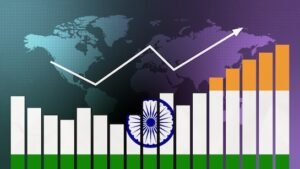India has steadily transformed from being a developing economy into one of the world’s fastest-growing markets. With its vast population, technological innovations, and rising global influence, India’s economic decisions reach far beyond its borders. Today, India’s economic policies not only shape domestic growth but also influence global trade, investment flows, and even geopolitical strategies.
In this blog, we will explore how India’s policy changes are shaping global economic trends, making the country a crucial player in international markets.
India’s Role in the Global Economy

As the fifth-largest economy in the world, India contributes significantly to global GDP. Its sheer market size, demographic advantage, and steady reforms make it attractive to businesses worldwide. From digital transformation and renewable energy to manufacturing and exports, India’s decisions affect international supply chains and global growth trajectories.
When India implements landmark policies—whether related to taxation, foreign direct investment (FDI), or sustainability—global investors and policymakers pay close attention.
Policy Reforms Driving Global Attention
1. Taxation and Ease of Doing Business

The introduction of GST (Goods and Services Tax) simplified India’s complex tax structure, making the business environment more investor-friendly. By streamlining compliance, India has become a more attractive destination for multinationals. This reform resonates globally, as companies re-adjust trade and pricing strategies across markets.
2. FDI Liberalization

India has progressively opened sectors like defense, insurance, and retail to foreign investors. This not only brings in capital but also introduces advanced technologies and global expertise. As policies encourage FDI, global firms diversify operations to India, reducing overdependence on traditional markets like China.
3. Digital Public Infrastructure

Initiatives like Aadhaar, UPI (Unified Payments Interface), and Digital India have created a blueprint for digital transformation. UPI has already gained international attention, with multiple countries exploring partnerships. This shows how Indian policies in digital finance are setting benchmarks for global economies.
4. Sustainability and Renewable Energy Investments

India’s push toward renewable energy and its commitment to achieving net-zero emissions by 2070 are impacting global climate strategies. By promoting solar, wind, and green hydrogen projects, India is creating new opportunities for international investors in clean tech.
Global Ripples of India’s Economic Policies

🌍 Impact on Trade
India’s trade policies influence global supply chains, especially in sectors like pharmaceuticals, IT, textiles, and agricultural exports. Countries dependent on Indian products recalibrate their trade strategies when policies shift.
💹 Impact on Financial Markets
Global stock markets often respond to Indian policy announcements, especially monetary policy changes by the Reserve Bank of India (RBI). For instance, an adjustment in interest rates or capital control policies can influence global investor sentiment.
🤝 Impact on Geopolitics
India’s stance on economic partnerships like BRICS, G20, and free trade agreements affects global alliances. The “Make in India” initiative, coupled with strategic decoupling from certain markets, impacts how global corporations diversify their manufacturing bases.
Challenges Ahead
While India’s policies foster growth, challenges remain. Issues like regulatory uncertainty, infrastructural bottlenecks, and income disparity can slow progress. Global investors often weigh these risks before making large-scale commitments. Addressing these challenges will be crucial for India to maintain its upward trajectory on the global economic stage.
Final Thoughts
India is no longer just an “emerging market”—it has become a key architect of global economic trends. From digital innovation to green energy and global trade, India’s economic policies are guiding how businesses and nations recalibrate strategies for the future.
As reforms continue, the world will keep watching India not just as a participant, but as a leader shaping the global economy.








